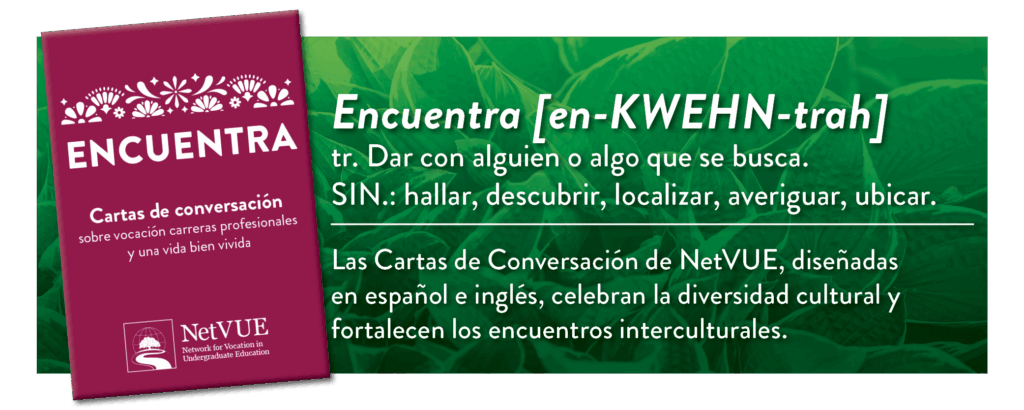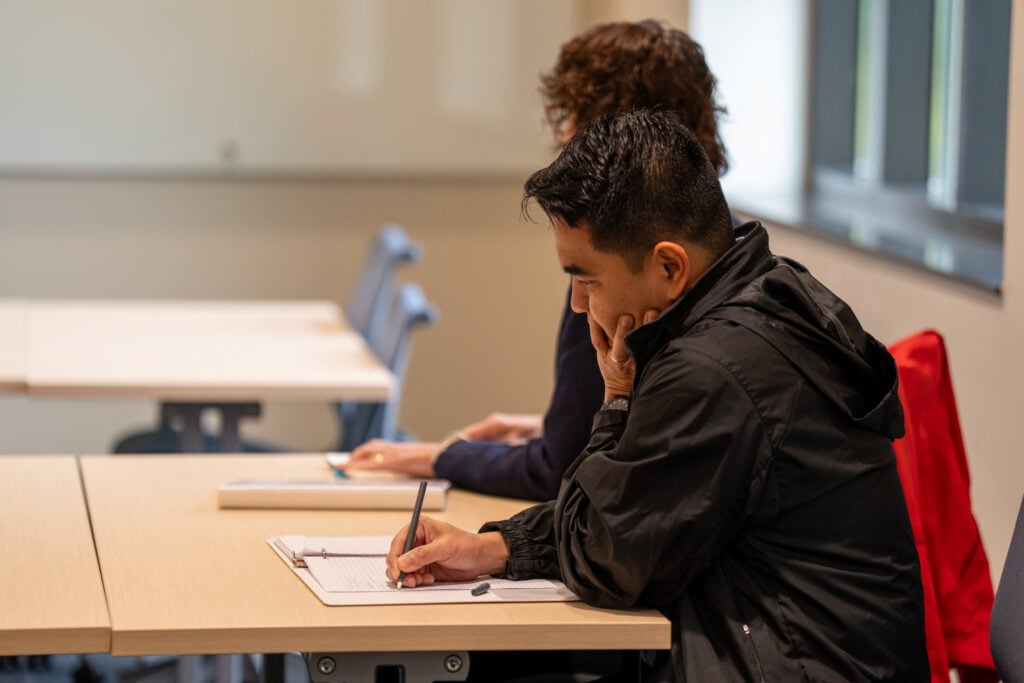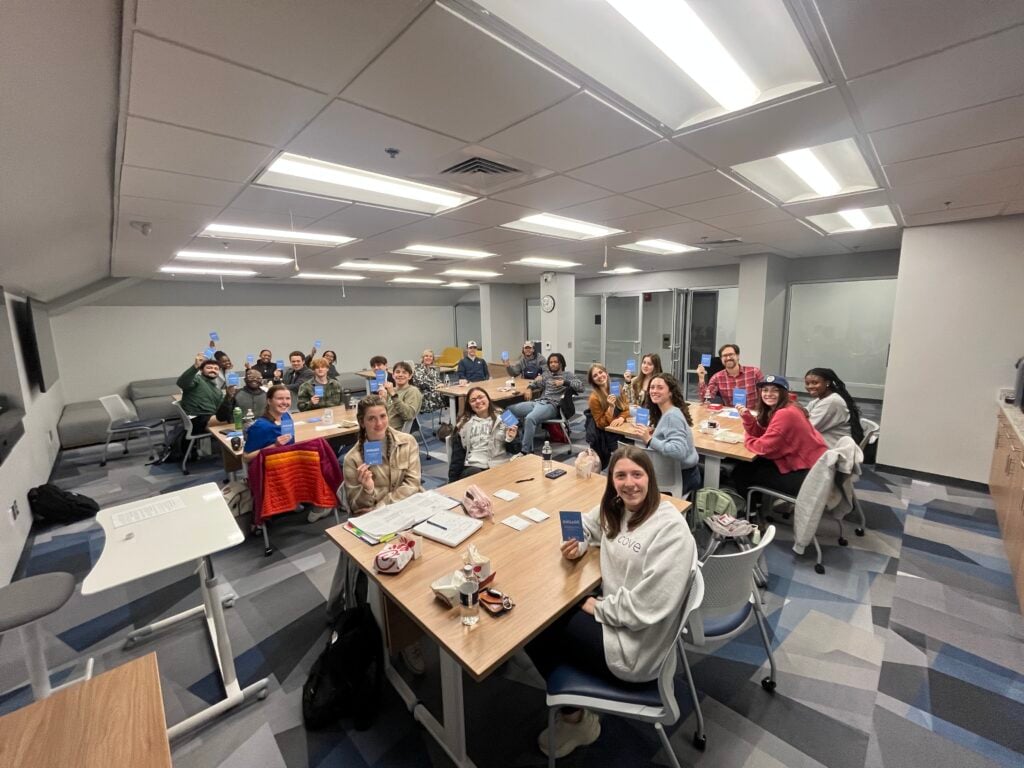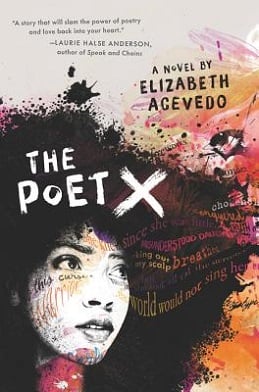
Nuestras raíces culturales—incluyendo la familia, comunidad, comida, geografía, idioma, rituales, fe, entre otras—moldean quiénes somos, cómo interactuamos con el mundo y las posibilidades que se abren ante nosotros. A su vez, las culturas de las que provenimos y en las que nos desenvolvemos influyen en el proceso de discernimiento de nuestro propósito y vocación, así como en nuestro sentido de pertenencia.
Las cartas Encuentra se enfocan en dos áreas principales: en celebrar y visibilizar las experiencias de los estudiantes hispanos/latines y en invitar a todos los estudiantes—independientemente de su origen cultural—a explorar cómo sus culturas han influido en su formación. Las preguntas planteadas en estas cartas preparan a los participantes para reflexionar sobre la manera en que sus raíces culturales moldean sus identidades, compromisos, relaciones, deseos y aspiraciones. Además, las cartas motivan a los estudiantes a conectarse con los dones que sus culturas aportan, a reconocer en sí mismos las contribuciones particulares que pueden ofrecer al mundo y a participar de manera inclusiva en encuentros interculturales.
Marcos conceptuales que inspiraron la baraja
El equipo que creó y diseñó la baraja determinó su marco conceptual cuidosamente, concibiéndolo como una herramienta para la reflexión cultural e intercultural.
- La baraja se mueve entre lo particular y lo universal, demostrando cómo las preguntas, cuando se guían por un lente cultural específico, pueden despertar sentimientos enriquecedores de asombro y descubrimiento comunes a la experiencia humana.
- La baraja nombra, honra y celebra un conjunto de culturas que emanan de las culturas hispanas, latinas, latinoamericanas, y latines estadounidenses. No obstante, no presupone que todos los estudiantes hispanohablantes o latines compartan las mismas experiencias de vida.
- A la vez, es probable que las preguntas resuenen con otros que tengan interés o que hayan compartido experiencias con:
- la migración voluntaria o forzada;
- navegar la vida en más de una lengua;
- ser etiquetado de alguna forma como “otro” por la sociedad; e
- identificarse como bicultural o transnacional.
- La baraja Encuentra también reta a los alumnos que la sociedad ha denominado culturalmente normativos a hacerse preguntas sobre su propia formación cultural y aumentar la conciencia sobre este proceso. Al hacer esto, es posible que los alumnos tengan que enfrentarse a preguntas que nunca antes hayan tenido que considerar.
Ideas de cómo usar las cartas Encuentra

Las cartas Encuentra fueron diseñadas para su implementación en diversos contextos educativos, abarcando desde el currículo académico formal hasta actividades extracurriculares y co-curriculares. Los creadores de estas cartas buscan fomentar en los participantes un pensamiento amplio y creativo que trascienda las respuestas convencionales.
Las cartas Encuentra tienen su aplicación natural en las humanidades y las ciencias sociales, incluyendo idiomas y literaturas del mundo, estudios globales y étnicos, sociología y psicología, entre otras disciplinas. Sin embargo, la competencia intercultural que estas cartas desarrollan resulta igualmente valiosa para futuros profesionales en campos diversos como STEM (Ciencias, Tecnología, Ingeniería y Matemáticas), educación primaria y secundaria, ciencias de la salud, liderazgo empresarial, derecho y formulación de políticas públicas.
Más allá del salón o aula de clases, las cartas Encuentra se adaptan fácilmente a diversos programas institucionales como estudios en el extranjero, iniciativas de multiculturalismo y de inclusión y pertenencia. Estas cartas también resultan valiosas para la reflexión en contextos como el aprendizaje comprometido con la comunidad, la vida espiritual y residencial, programas de liderazgo estudiantil, equipos deportivos y, naturalmente, las oficinas dedicadas a la exploración vocacional y al propósito de vida.
Las declaraciones de misión de muchas instituciones miembros de NetVUE se enfocan en formar estudiantes como ciudadanos globales, reconociendo que los encuentros interculturales son parte integral de nuestras vidas personales y profesionales. Las cartas Encuentra respaldan directamente esta formación integral.

Las cartas de conversación de NetVUE han demostrado ser un recurso enriquecedor, no sólo para la formación estudiantil sino también para el desarrollo profesional y personal de los empleados y profesores universitarios. Los profesores y empleados que usan las cartas entre ellos descubren que les prepara mejor para usarlas con sus estudiantes. Además, les ha causado una grata sorpresa descubrir qué tan enriquecedoras pueden ser las cartas para su propio sentido de crecimiento vocacional.
Los creadores de la bajara Encuentra les invitan a aprovechar este descubrimiento y utilizar las cartas para explorar los contornos de su propio propósito y sentido de la vida y cómo estos se interseccionan con sus raíces culturales y formación personal. Examinar sus propias historias de familia, comunidad, fe, geografía, y más, como una forma de explorar la cultura y la vocación, puede ser una experiencia poderosa en sí, a la vez de ayudarles a facilitar conversaciones con los alumnos que requieren cuidado, vulnerabilidad, compasión, y valentía.
Consideraciones especiales
Las cartas Encuentra, al igual que las otras cartas de conversación de NetVUE, deberían usarse con atención y cuidado. Los facilitadores de la conversación deberían tener en mente que al ser expuestos a ciertas preguntas, los alumnos requerirán tiempo para reflexionar, formular su respuesta antes de hablar, o inclusive reflexionar con la voz interior sin compartir su respuesta. Aún más que las otras cartas de conversación de NetVUE, es posible que la baraja Encuentra requiera pausas para procesar ideas, quizás empezando con una reflexión escrita, en un diario, o en conversación en parejas o grupos de tres en vez de un grupo grande.
Ningún estudiante debería sentirse presionado a compartir su respuesta públicamente o hablar en nombre de su comunidad o de aquellos que comparten—o parecen compartir—su herencia cultural.
Hay una gran diversidad entre los estudiantes que se autoidentifican como hispanos y/o latines.
- Hay los que serían designados como hispanos y/o latines por los demógrafos, pero que prefieren identificarse de otra forma, como chicana o panameño-americana o con ninguna etiqueta identitaria.
- Algunos alumnos hablan español. Entre ellos, algunos lo hablan pero no lo escriben. Otros alumnos lo comprenden pero no lo hablan. Y a la vez hay otros que hablan con fluidez, pero eligen en qué circunstancias usar la lengua. La mayoría de los estudiantes emplea el cambio de código de algún tipo pero el Spanglish se expresa de muchas formas diferentes, las cuales pueden despertar diferentes actitudes o sentimientos.
- También habría que tratar el tema de la interseccionalidad. Los estudiantes experimentan sus identidades hispanas/latinas de formas diferentes dependiendo de una variedad de factores e intersecciones con otras identidades y experiencias, por ejemplo: la identidad racial o étnica, el estatus legal, la identidad de género, la identidad sexual, la religión, la familia, el origen geográfico, y más.
Finalmente, la baraja Encuentra busca equilibrar la celebración de la cultura con el reconocimiento de los retos que emergen de la diferencia cultural en un mundo no equitativo. Los diseñadores de las cartas no sólo afirman que estos extremos pueden sostenerse en una tensión productiva, sino que también ven la capacidad de navegar esta tensión, de forma personal e interpersonal, como una de las claves para cultivar relaciones interculturales que generen inspiración.
Recursos suplementarios
Los diseñadores de las cartas Encuentra usaron los siguientes recursos al desarrollar el marco conceptual de la baraja y para elaborar las preguntas. Es posible que también le resulten útiles:

Stars and Constellations
with Patrick Reyes
Season 2, Episode 3 | November 3, 2021

An Investment of Time
with Richard Sévère
Season 3, Episode 9 | June 1, 2023

Change Maker
with Abel Chávez
Season 5, Episode 6 | February 27, 2025

Vocation and Diversity: Some Institutional Considerations
by Florence Amamoto
May 21, 2019

Rethinking and Unlearning: Imagining New Ways of Being in Community
by Hannah Schell
October 13, 2020

The Problem with Colorblind Mentoring
by Hannah Schell
April 27, 2022

Familismo, Success, and Service to Others
by Hannah Schell
May 19, 2022
Creadores de las cartas de conversación Encuentra
Krista E. Hughes (co-editora), Director of Resource Development, NetVUE; Adjunct Professor of Religion, Wofford College (SC)
Esteban Loustaunau (co-editor), Director, Center for Purpose & Vocation and the Community Service Learning Program, Professor of Spanish, Assumption University (MA)
Emily Davidson, Associate Professor of Hispanic & Latino Studies, Pacific Lutheran University (WA)
Leslie Flores, Director, Title IX & Equity Compliance, Texas Lutheran University (TX)
Monique Jiménez-Herrera, Vice Provost for Academic Initiatives & Faculty Success, Professor of Psychology and Licensed Psychologist, St. Edward’s University (TX)
Amalia E. Merino, Hispanic Academic Success Coordinator, Southwestern University (TX)
Sarah Micu, Director of Student Success Services, Fresno Pacific University (CA)
Janet Nava Cardenas, Assistant Director of Student Employment & Career Education, Career & Professional Development, Mount Saint Mary’s University (CA)
Ezequiel Peña, Professor of Psychology, Our Lady of the Lake University (TX)
Lorri J. Santamaría, Associate Vice President Strategy, California Lutheran University (CA)

To report a technical problem with the website, or to offer suggestions for navigation and content issues, please contact Alex Stephenson, NetVUE communications coordinator, at astephenson@cic.edu.





